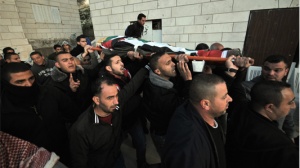Over the past week, Al-Haq documented the killing of Lubna Munir al-Hanash (21 years old) next to al-‘Arroub refugee camp, Hebron governorate. Lubna was walking with a friend when an Israeli soldier fired live ammunition at her head. On the same day, a Palestinian youth, Saleh Ahmad al-‘Amrin (15 years old), died at the Haddasa ‘Ein Karim Hospital, Jerusalem, after having been shot in the head by an Israeli soldier on 18 January.
In recent months, the Israeli army has increasingly resorted to firing live ammunition at Palestinians who have approached the Annexation Wall, have participated in demonstrations, or have been in the vicinity of the buffer zone in the Gaza Strip. As a result, six Palestinian civilians have been killed by live fire in the month of January alone despite not posing any immediate threat to Israeli soldiers’ lives.
Lubna Munir al-Hanash (21 years old) – al-‘Arroub refugee camp – Hebron Governorate
 In the early afternoon of 23 January, Su’ad Yousef Ja’arah and Lubna were walking around the Palestinian Technical College, north-west of al-‘Arroub camp and were approaching the main road (Road 60) when they heard gunshots.
In the early afternoon of 23 January, Su’ad Yousef Ja’arah and Lubna were walking around the Palestinian Technical College, north-west of al-‘Arroub camp and were approaching the main road (Road 60) when they heard gunshots.
Su’ad saw an Israeli soldier approximately 100 metres away, standing next to a white civilian car. The soldier then began shooting directly at the two women, who ran back to the college in an attempt to avoid the gun fire. Su’ad was shot in her left hand but kept running towards the institute, thinking that Lubna was following her.
When Su’ad arrived at the school she realised that she was alone. She assumed that Lubna had escaped or had been arrested by the Israeli soldiers. Su’ad was promptly transferred by a Red Crescent ambulance to al-Ahli Hospital in Hebron. At approximately 6:00 pm, Su’ad underwent surgery on her hand. Immediately before entering the operating theatre, she was informed that Lubna had been killed in the incident. Su’ad recalls that, when she was walking on the road with Lubna, there was nobody in the vicinity and nothing that could justify the Israeli soldier’s use of live ammunition. (Al-Haq Affidavit No.8326/2013)
On the same day, at approximately 1:40 pm, the Palestinian Red Crescent Society was informed of the incident. At 2:10 pm, a Red Crescent ambulance paramedic, Yousef 'Abdallah Tamizah (42 years old), arrived at the scene of the incident and found Lubna lying face-down on the road and surrounded by Israeli soldiers. Lubna was immediately transferred to al-Ahli Hospital but was declared dead one hour later. According to the hospital medical reports, Lubna was hit by a live bullet that penetrated the left side of her face and then perforated the skull. Lubna lived with her parents and 4 siblings in Bethlehem and was a Political Sciences student at Abu Dis University, Jerusalem governorate.
According to Al-Haq reports, at approximately 1:35 pm, shortly before Lubna and Su’ad were shot, a group of youths threw some stones at a white Israeli car that was driving on Road 60. After throwing stones the youths ran away. According to witnesses, by the time the car had turned around and returned to the scene, the youths had fled. Residents of the refugee camp stated that, when the Israeli car stopped, there was no damage to the vehicle.
In a situation of military occupation characterised by the lack of hostilities, the rules governing the use of force are codified by international human rights law. Accordingly, the Israeli occupying forces must respect the right to life of civilians in the Occupied Palestinian Territory (OPT). The use of lethal force by the army may be justified only in extremely strict circumstances: in self-defence against imminent threat of death or serious injury or to defend someone else from the imminent risk of death. The act of stone-throwing did not reach the threshold to justify the use of lethal force.
The use of live ammunition by the Israeli military against unarmed Palestinian civilians posing no threats to soldiers’ lives amounts to a violation of the right to life under international human rights law. At the same time, it amounts to a wilful killing, which constitutes a grave breach of the Fourth Geneva Convention.
For further information on the use of live fire against Palestinian civilians by Israeli soldiers in the past month, see also 21-year-old Civilian Killed by Israeli Army in the Gaza Strip.



 In the early afternoon of 23 January, Su’ad Yousef Ja’arah and Lubna were walking around the Palestinian Technical College, north-west of al-‘Arroub camp and were approaching the main road (Road 60) when they heard gunshots.
In the early afternoon of 23 January, Su’ad Yousef Ja’arah and Lubna were walking around the Palestinian Technical College, north-west of al-‘Arroub camp and were approaching the main road (Road 60) when they heard gunshots.